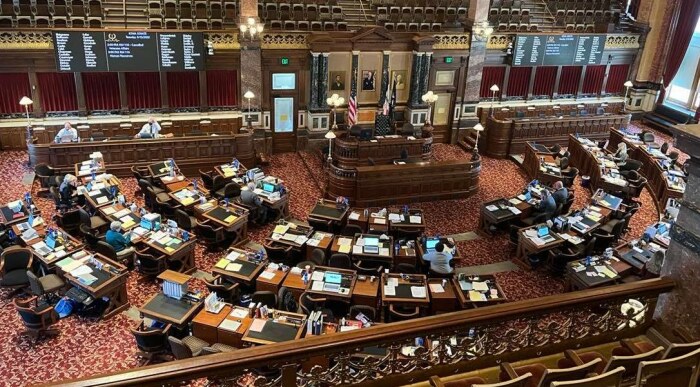Steve Corbin is emeritus professor of marketing at the University of Northern Iowa and freelance writer who receives no remuneration, funding, or endorsement from any for-profit business, nonprofit organization, political action committee, or political party.
Most citizens don’t know that Republican leaders in Iowa, Utah, Kansas, and Florida are limiting journalists’ access to open-to-the-public legislature and gubernatorial sessions. Their actions raise the question: “What issues and policies are GOP elected officials trying to hide?”
Furthermore, what is there about the First Amendment to the Constitution – specifically freedom of the press – Republicans don’t understand? Maybe GOP’ers are demonstrating their anti-democracy intentions, giving favor to control the media as witnessed by fascists countries such as Russia, China, North Korea, and Venezuela.
According to information published by Freedom of the Press Foundation, 72 media access denial incidents occurred in the last four years. Republicans denying or limiting journalists’ access to government events appears to be retaliatory or done without meaningful justification.
Florida’s Republican governor blocked multiple journalists from covering the signing of a controversial election bill last May. This year, GOP leaders in Iowa, Utah, and Kansas kicked journalists out of their historic press benches on the Senate floor and moved them into a gallery far from the action. The press bench permitted reporters to observe debate, have immediate access to legislators and report the facts. The new rules allow legislators to duck out and run away from journalists, avoiding being held accountable by their constituents.
Steve Morris, who led the Kansas GOP from 2005 to 2013, wrote in a Kansas Reflector editorial, “Placing restrictions on journalists in the Senate chambers suggests there is something to hide or that leadership is taking unwarranted and unnecessary retaliation against reporters.”
Parker Higgins of the Freedom of the Press Foundation spoke with Iowa and Kansas reporters about the restrictions and wrote, “the effect has been to diminish the ability for journalists to effectively cover legislative action.”
Richard Gilbert, former press secretary for Republican Governor Robert Ray decried the changes in a column for Julie Gammack’s Potluck, which was later published in the Des Moines Register. Reflecting on Republicans restricting access to the media, Gilbert stated, “it is enough to set off alarm bells for anyone who cares about clean and open government at all levels.”
He continued, “As a press secretary, my job was not to control access to what went on in state government. It was to make the information accessible.”
Which brings me to the obvious question: What’s the objective of stonewalling or making it more difficult for the reporters covering deliberations of the Iowa Senate? What don’t these elected officials want the people of Iowa to know or see? […]
As to the latest sideshow in the Iowa Senate: If the legislators want to extract petulant payback on the press corps because the coverage of their august body is often embarrassing, then perhaps they should quit doing and or saying so many stupid things.
Media access restrictions by Republican elected officials in Iowa, Utah, Kansas, and Florida undermine the free press, a cornerstone of democracy. Voters need to confront Republicans as well as Democrats seeking election or re-election and ask about their views on press freedom.
Whenever Republican leaders restrict journalists’ access, it appears their goal is to abandon democracy. If GOP’s anti-First Amendment actions are permitted to continue, who knows what’s next. Maybe we’ll see something like neo-Nazi banning of books, disinformation about critical race theory, anti-LGBTQ legislation, using public taxpayer funds to support private education and invoking voter suppression.
Oh, wait! We’re already witnessing those draconian measures in GOP-controlled states. The next authoritarian action by Republicans should be of no surprise.
Top photo: A mostly empty press bench (to the left and right of the presiding officer’s chair) in the Iowa Senate chamber, as photographed on March 15, 2022.

